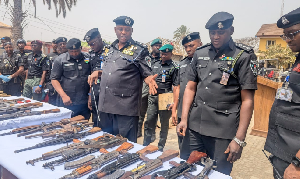The United States is a popular destination for tens of thousands of immigrants and temporary workers from the west African nation of Ghana. Mostly they flock to America's major cities where they hope to better themselves economically. Indeed, some succeed so well they are becoming homeowners back home in Ghana, where enormous prestige is lavished on those who have been able to build or acquire their own domains.
Outside, it is the Bronx and bitter cold. But inside the Kantomonto African Market, it is almost warm and aromatic enough to be Accra, Ghana's capital city.
Fifteen year old Fatima, who sells popular Ghanaian CDs behind the counter after school, was born in America. But her parents are among the thousands of Ghanaians who emigrated here during the past 20 years. Fatima's father began life in the United States in 1980 as a security guard. Eventually, she says, he saved enough money to build a four-bedroom house back home.
Fatima: "Some people, they come here, and they make it. Some people, they come here, and they don't. A lot of people they come here, they work for years, and it takes them a long time, most of the time, just to get any little money. And any little money they do get, they establish a home back home, or they do business back home."
Phillips: What is your home back there like?"
Fatima: "It's beautiful. It's nice and big [and] roomy. It has everything. I wouldn't trade it in for the world."
The place to go in the Bronx to buy a Ghana home is "Ghana Homes" a simple storefront real estate firm on nearby Tremont Avenue. Company president Kwasi Kissi says he's has sold nearly one hundred such homes during his four years of operation.
Kissi: "Typically, a Ghanaian who winds up here came here because of economic pressures at home. They still love their country very much. And they all hope that someday they will be able to go back to settle at home."
Phillips: "That's where you come in?"
Kissi: "Yeah. Absolutely. That's where I come in. We give them information and guide them through the process. Because it's not easy. Buying a home in a country while you're not living there, you've got to be careful because you can easily be ripped off. But through our services a lot of Ghanaians have been able to purchase beautiful properties in Ghana."
Phillips: "What does a home mean in the African or the Ghanaian cultural context? What is a home in the heart?"
Kissi: "A home is what anchors you to your being. And it's very important. Nobody wants to be homeless anywhere, but particularly at home. So having a home at home is an extremely important part of everyone's agenda."
Joseph Baidoo, a Catholic priest, is one of Mr. Kissi's more recent customers. "The kitchen of course," he says when asked about his favorite part of his new home. "You can see my size, I am a good eater."
Unlike many of Mr. Kissi's clients, though, Reverend Baidoo does not intend to return to Ghana one day to live fulltime.
Baidoo: "I came here about ten years ago to go to school, and I loved this country so much I decided to stay."
Phillips: "But yet you bought a place in Ghana too."
Baidoo: "Yes I did. It's interesting. I have family back home. Every one in my family is there. And first of all you want a place for them, a place for them to be comfortable. And when you go you want a place to stay. Especially when you bring your friends with you, you want to make an impression. Ghanaians are known for our hospitality. And a home helps."
Fifty-one year old Frank Samad, is a Ghanaian-American grocer who built his own four-bedroom home in the Accra suburbs in the early 1990s, even though he might have preferred to invest the money into his Bronx store. Mr. Samad says he made the purchase to mainly to 'makes an impression' on family and friends back home.
Samad: "Those who emigrated from Ghana especially, our main goal is when you come abroad, you try to have a piece of land back at home. That is always our first intention. That's the only symbol that lives up to you. Like if you have traveled from Ghana all those years. What have you done? People always assess you. If you are able to put up a building, then they know that at least you have done something! ? So you are treated with respect. In Akan, which is Ashanti, they even call you 'Nana.' 'Nana' means 'Chief!' You are a big prestigious person. So you have those kinds of titles. For just having a house! It's not a big deal here. Over there, it is a big deal. If I go to Ghana and lived in a hotel, I would consider myself a failure."
Phillips: "Now, your wife is over there now right?"
Samad: "Yes, she's over there now."
Phillips: "Does she have more status too because her husband has a house?"
Samad: "Of course she does. She is being treated like a queen. If I am a king, she is a queen mother, right?"
Phillips: "So it helped with your marriage too, huh?"
Samad: "Absolutely, yes! Yes!"
Twenty six year old Eric Nee Adeseh has been in America about fifteen months. As a student, with a part-time job in a bar, the reality of owning a home in Ghana seems far off, even though the dream is always close to his heart.
Adeseh: "I have a wife and two kids and I am looking to having a three-bedroom house that we can have at least one as a master bedroom for me and my wife, and at least one of each for the kids actually."
Phillips: "Are they back home in Ghana now or are they with you here?"
Adeseh: "No. They are back home in Ghana."
Phillips: "You miss them."
Adeseh: "I miss them so much. In America, it's very cold here. And unless you have a determination, that 'this is what I want to achieve,' honestly, you can't stand it. And I go home and I look at a picture of my kids and I say to myself, 'this is what I am doing for you,' 'I am sacrificing this for you.'"
But Mr. Adeseh says it is more than the desire for status or comfort that keeps him working toward his dream: it's an almost mystical love for his native land he shares with many of his fellow Africans that keeps him both striving and honest. "We have an expression. Sometimes we say 'A bird, a flying bird, goes everywhere, in the skies, but when it dies, it comes back down to earth.' This is an example for Ghanaians. We are here in New York, in Chicago and everywhere, flying, but trust me: no matter what it is, eventually we all get home," he says. "And that is why a home in Ghana should be a priority in our lives. We come from a very great country. No matter what you do in America, you definitely have to go home. one day and ? that should be our dream."












